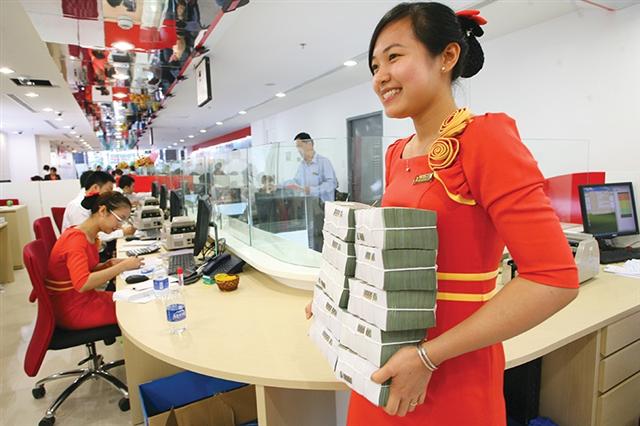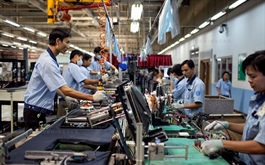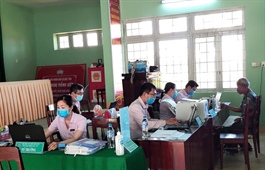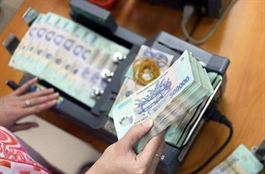Local lenders prepare for pandemic shock
Local lenders prepare for pandemic shock
Public health challenges have thrown Vietnam’s banking system into gyrations, pushing lenders to become more risk averse and brace for a wave of defaults, amidst efforts to cut interest rates from the central bank to offset the economy.

Local lenders prepare for pandemic shock - illustration photo
|
Ngo Quang Trung, CEO of private lender Viet Capital Bank, said the bank is actively rescheduling loans for customers hit by the pandemic in parallel to keeping a close eye on controlling credit quality to mitigate the risk of bad debts.
Last week, according to the State Bank of Vietnam (SBV), credit to the economy has shown some recovery signals yet still remained at a low level.
“Over past years, we have always instructed banks to strictly control credit in riskier areas such as real estate, infrastructure projects because of the high-risk nature of short-term funds used for medium and long-term loans,” said Nguyen Thi Hong, Deputy Governor at the SBV. “The SBV pledged to take drastic actions to buoy the domestic economy, chief among them a reduction of interest rates, as disruption stemming from the crisis leaves scars on the economy.”
Nguyen Thi Thanh Huyen, financial analyst at KB Securities, told VIR that the first and foremost operational risk are those related to the cautious psychology of contagion leading to the reduction in face-to-face interaction between customers and bank staff also related to the risk of staff getting infected.
“Several banks have coped with these risks by cutting off front employees, switching to work from home, and investing in automotive technology to reduce face-to-face interaction by developing more products online and executing a digital banking plan especially with retail banks such as Standard Chartered and VIB,” said Huyen.
She also added that there are risks of stagnant credit growth as enterprises are reluctant to borrow money to expand the business, or if they do, they struggle to meet banks’ requirements.
Though the majority of banks have offered lower interest to customers to help them ride out the bumps, this stagnant state of credit growth will last until the economy can sustainably recover.
Asset quality risk revolves around risks of escalating non-performing loans (NPLs), especially those banks who have high exposure to tourism, hospitality, international trade, logistics, and supply chains, such as Eximbank.
Most Vietnamese banks have to choose between sustainable growth by slowing down their credit to focus on better loans versus high credit growth as having to expand their loan to riskier customers.
For example, VPBank has deployed different measures to protect loans’ quality such as shifting the portfolio to better risk categories that are existing customers with suitable adjustment in policies.
Furthermore, the bank has proactively reduced origination of customers whose operating areas can be impacted by the outbreak and deployed specific actions for each portfolio segment to rationally increase collection intensity. VPBank’s consumer finance subsidy, FE Credit, also set specific targets to mitigate negative impacts. Particularly, for new-to-bank (NTB) customers, VPBank stops the disbursement of personal loans for NTB customers of high-risk segments to reduce lifetime loss and limits proactively in reducing sale volumes of two-wheelers loans and consumer durable loans.
For existing customers, VPBank reduces the sale volumes of personal loans, cross-sell and top-ups, and focuses on credit cards but is reducing credit limits, along with placing limits on blocking inactive cards.
Hence, as up the second quarter of 2020, VPBank recorded lower NPLs at a ratio of 2.61 per cent compared to 2.89 per cent of the same period last year. However, special loans roared to 47 per cent. With FE Credit, the NPL ratio was stable at 5.3 per cent.
As the outbreak continues to drag on the whole economy, debt collectors have struggled to reach borrowers to negotiate unpaid loans.
Nguyen Duc Thach Diem, CEO of Ho Chi Minh City-based commercial lender Sacombank emphasised, “Sacombank’s NPLs volume rose by VND712 billion ($30.96 million) by the end of the second quarter compared to early 2020. This is mainly because many of our customers, who are vulnerable and facing financial hardships, could not pay back due to the outbreak.”
Sacombank has been under pressure to clean up a pile of bad loans after a tie-up deal with Southern Bank in 2015 that has weighed on its results.
Likewise, SCB continuously auctioned a number of large-value assets such as BMC Hung Long project in District 7 of Ho Chi Minh City with an initial price of VND2.5 trillion ($110 million), together with the land use right of Phuoc Son Warehouse in Thuan An commune in the southern province of Binh Duong with a price of VND830 billion ($36.1 million).
In the first six months of 2020, VietinBank has bought back more than VND6 trillion ($261 million) of debts sold to Vietnam Asset Management Company. The bank also made a provision covering nearly half of the remaining debt value.
On the other hand, experts cautioned that projects with total value above VND30 billion ($1.3 million) pale in comparison with lower-value equivalents when it comes to attracting buyers. This can be easily explained since many banks’ clients are cash-squeezed, and in a particularly risky position because of the crisis.
Many industrial park projects with a value of around VND1 trillion ($43.5 million) have been offered for sale many times with multiple discounts, but so far there are no investors showing their keen interest.
According to data compiled by FiinGroup, the net interest margin (NIM) of 19 listed banks dropped by 8.8 basis points compared to the first quarter of 2020 to 0.76 per cent. This was the largest decline since the first quarter of 2018.
The NIM of banks in the first six months clearly reflected the impact of interest waiver or reduction for customers affected by the COVID-19 pandemic.
Besides that, restructured loans are recorded as performing loans which do not require provisions. Therefore, once these temporary regulatory changes expire, the negative impacts of the pandemic will be factored in credit quality as well as profit after tax of banks.




























